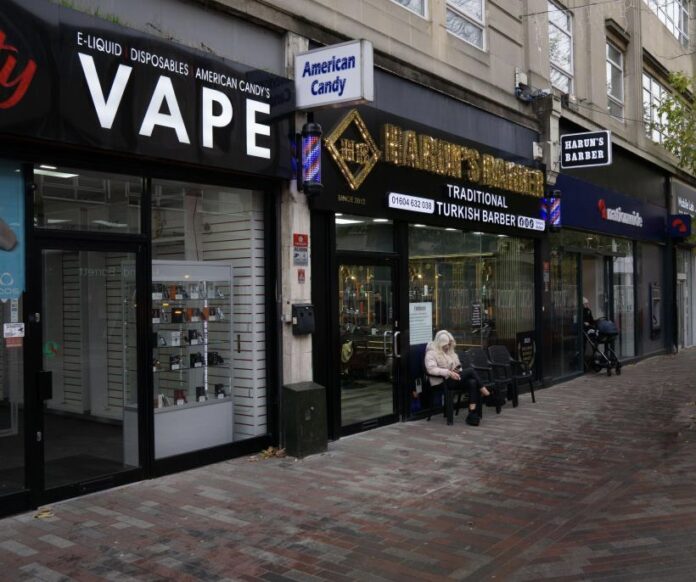The Government needs to take urgent steps to reverse the deterioration of England’s High Streets – particularly in the North, and in more deprived and coastal areas.
A new report published by Health Equity North has found that the quality of the High Street continues to decline across the country – with vital community amenities such as banks, pharmacies, public toilets and supermarkets being replaced by vape shops, bookmakers and takeaway outlets.
This trend has accelerated over the last decade, due to austerity, the pandemic, the rising cost of living, and changing spending habits.
The authors warn that these “Ghost Towns” are making the English High Street a more isolating, unsafe and unhealthy place. They urge the Government to step in to protect places which support the community in our town centres, and to help regulate more unhealthy amenities.
The analysis shows that the decline of the high street is particularly stark in deprived areas and areas in the North – places which are already struggling with health and economic inequalities.
The research team, led by Health Equity North academics from Newcastle University and The University of Manchester, set out to catalogue the changing face of High Streets, using ordnance survey data to track the distribution of 16 key amenities between 2014 and 2024.
These include “health promoting” amenities such as pharmacies and supermarkets, and “health reducing” amenities such as takeaways, bookmakers, vape shops and alcohol-only outlets. The authors also observed the availability of “third spaces”, which are described as “places to go which are not home or work”. These include shopping centres, pubs, department stores and cafes.
The report finds that there has been a worrying decline in the quantity of “health promoting” amenities, retail and “third spaces” over the last ten years, with more unhealthy alternatives taking their place.
This has been caused by several local and national shocks over the last decade, including shifting consumer habits, austerity, the cost of living crisis, the 2017 “retail apocalypse” and the COVID-19 pandemic.
The number of vape shops increased by nearly 1200% in England between 2014 and 2024 and
there are now more than three times more vape shops in deprived areas compared to the least deprived ones
There are 25 times more pawnbrokers in deprived areas, and more than three times more bookmakers
Takeaway shops are up by 24% across the whole of England, and by 30% in the most deprived areas
Conversely, the number of banks and building societies has dropped by 40% nationally, and 57% in the most rural areas
Pharmacies are down 20% in England’s most deprived areas, compared to 13% in the least deprived
There was a 38% drop in public toilets in the most deprived areas, compared to a national average decrease of 25%, affecting women, children and the elderly the most
Supermarkets have also decreased by 22% in deprived areas – compared to a national average decrease of 10%.
These trends are particularly pronounced in northern communities, as well as coastal areas which often suffer from inequality and poorer health outcomes.
Regional findings from the analysis show that there are 12.8 unhealthy takeaway outlets per 10,000 people in the North, compared to 8.9 in the South
The increase in takeaway outlets in the North is almost double the figure in the South, at 31% compared to 18%
There has been a 35% rise in takeaways between 2014 and 2024 in the North East, 33% in the North West, and 29% in Yorkshire and the Humber
There are twice as many vape shops in the North as in the South
Public toilet provision is down 32% in the North compared to 19% in the South
The decline in supermarket provision is 23% in Yorkshire and the Humber, 14% in the North East and North West, and just 5% in the South
The North has seen a decrease of 11% in department stores compared to an 12% increase in the South
There has been an uneven recovery from the pandemic, with 20% most deprived areas experiencing a reduction of 32% in department stores, compared to an 81% increase in the 20% least deprived areas
In coastal areas, there is almost double the amount of pawnbrokers, compared to non-coastal areas, as well as a higher amount of bookmakers.
The authors have called on central Government and the Metro Mayors to take steps to save High Streets by helping them adapt to new community needs, rather than return to what they were in the past.
Dr Luke Munford, Academic Co-director at Health Equity North and Senior Lecturer in Health Economics at the University of Manchester, said: “People in deprived areas and in the North are already facing worse outcomes. In particular, these communities experience lower life expectancy and higher levels of health inequality, compared to communities in the South.
“The sharp increase in fast food outlets, vape shops, bookmakers and other health-reducing amenities in their towns and cities adds a further risk to their health, and could make the gap between North and South even greater.
“We believe that urgent action is needed to reverse this trend. Local authorities should be empowered to regulate unhealthy amenities, and incentivise places that offer vital services and help communities to thrive.”







